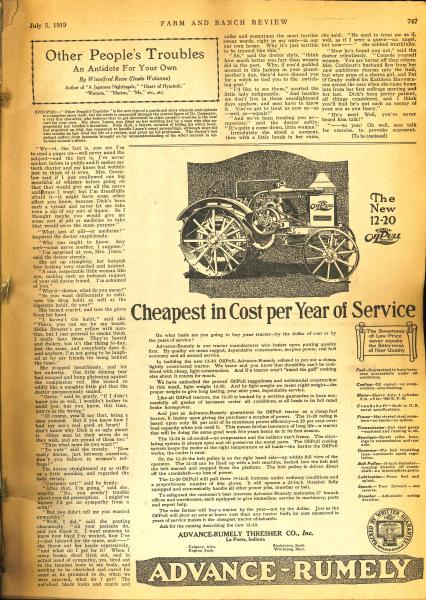“We—el, the fact is, you see I’m to read a paper on—well never mind the
subject—and the fact is, I’ve never spoken before in public and it makes my
teeth chatter and my knees feel wobbly just to think of it even. Mrs. Green-law
said if I just swallowed one big mouthful of whiskey before going on that that
would give me all the nerve and brass I want; but I’m dreadfully afraid it—it
might have some other effect you know, because Dick’s been such a tyrant and
never let me take even a sip of any sort of liquor. So I thought maybe you
would give me some sort of pill or medicine to take that would serve the same
purpose.”
“What sort of pill—or medicine?” inquired the doctor suspiciously.
“Why you ought to know. Any sort—some nerve soother, I suppose.”
“I’m surprised at you, Mrs. Jones,” said the doctor sternly.
She sat up straightly, her babyish face looking very startled and injured.
“A nice, respectable little woman like you, making such an indecent request of
your old doctor friend. I’m ashamed of you.”
“Why d—doctor, what do you mean?”
“So you want deliberately to cultivate the drug habit as well as the cigarette
habit, do you?”
She turned scarlet, and tore the glove from her hand.
“I haven’t the habit,” said she. “There, you can see by my hands; Nellie
Streeter’s are yellow with nicotine, but I just pretend to smoke them. I
really hate them. They’re horrid and chokey, but it’s the thing to-day, just
the same, and everybody does it, and anyhow, I’m not going to be laughed at by
my friends for being behind the times.”
She stopped breathlessly, and bit her underlip. One little shining tear had
escaped and hung glistening against the complexion veil. She looked so oddly like
a naughty little girl that the doctor unconsciously smiled.
“Gerty,” said he gently, “if I didn’t know you so well, I wouldn’t bother
to scold you; but you know, this time, you’re in the wrong.”
“Of course, you’ll say that, being a man yourself. But if you knew how I had my
sex’s real good at heart! I don’t know why Dick is so ugly about it. Other men let
their wives do as they wish, and are proud of them too.”
“Then what more do you want?”
“To vote” said she crossly. “Now really doctor, just between ourselves,
don’t you believe in woman’s suffrage?”
The doctor straightened up as stiffly as a little manikin, and regarded the lady
sternly.
“Certainly not!” said he firmly.
“After that, I’m going,” said she, angrily. “No, you needn’t trouble about
your old prescription. I might’ve known I’d get no sympathy from a man!”
“But you didn’t tell me you wanted! sympathy.”
“Well, I did,” said she pouting charmingly. “All your patients do, and you
know it. I want someone to know how hard I’ve worked, how I’ve j—just labored
for the cause, and——” she threw out her hands expressively, “and what do I
get for it? When I creep home, dead tired out, and in actual need of sympathy,
yes, tired out to the teeniest bone in any body, and needing to be cherished
and cared for same as he promised to do, when we were married, what do I get?
The awfullest black looks and snarls and sulks and sometimes the most terrible
swear words, right in my own—in our our own home. Why it’s just terrible to be
treated like this.”
“Alt,” said the doctor slyly, “think how much better you fare than women
did in the past. Why, if you’d gadded around in this fashion in your
grandmother’s day, they’d have doused you for a witch or tied you to the
switching post.”
“I’d like to see them,” snorted the little lady indignantly. “And besides
we don’t live in those unenlightened days anyhow, and men have to know it.
You’ve got to treat us now as—as —well, as—equals!”
“And we’ve been treating you as—superiors,” said the doctor softly. “It’s
quite a come down, little woman.”
Irresolutely she stood a moment, then with a little break in her voice, she said:
“He used to treat me as if, well, as if I were a queen—an angel, but
now——.” she sobbed wrathfully.
“Now he’s found you out,” said the doctor relentlessly. “Console yourself
woman. You are better off than others. Mrs. Cuthbert’s husband flew from her
new ambitious charms into the frail, but wiser arms of a chorus girl, and Pat
O’Grady cuffed his Kathleen Mavourneen across the ears when she came home late
from her first suffrage meeting and her last. Dick’s been pretty patient, all
things considered, and I think you’ll find he’s not. such an enemy of your sex
as you fancy.”
“He’s not! Well, you’ve never heard him talk!”
“——to you! Oh well, men talk for exercise, to provoke argument.”1

![Facsimile image for Other People’s Troubles: An Antidote to Your Own [Part 1]](images/cooking.jpg)
![Facsimile image for Other People’s Troubles: An Antidote to Your Own [Part 2]]( facsimiles/Other_Peoples_Troubles2_tiny.jpg)
![Facsimile image for Other People’s Troubles: An Antidote to Your Own [Part 3]]( facsimiles/Other_Peoples_Troubles3_tiny.jpg)
![Facsimile image for Other People’s Troubles: An Antidote to Your Own [Part 4]]( facsimiles/Other_Peoples_Troubles4_tiny.jpg)
![Facsimile image for Other People’s Troubles: An Antidote to Your Own [Part 5]]( facsimiles/Other_Peoples_Troubles5_tiny.jpg)
![Facsimile image for Other People’s Troubles: An Antidote to Your Own [Part 10]]( facsimiles/Other_Peoples_Troubles10_tiny.jpg)
![Facsimile image for Other People’s Troubles: An Antidote to Your Own [Part 11]]( facsimiles/Other_Peoples_Troubles11_tiny.jpg)